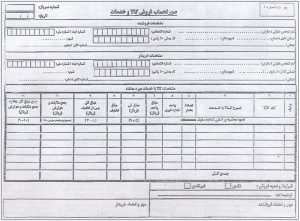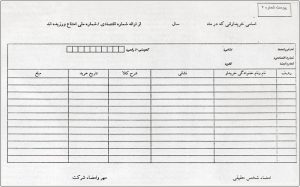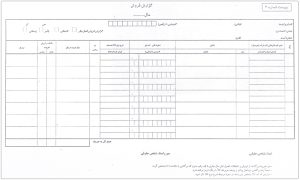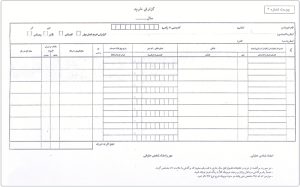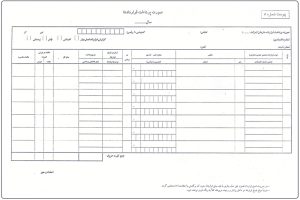CHAPTER ONE: DEFINITIONS
Article 1.
The terms used in this Act have the following meanings:
The Act:
The Foreign Investment Promotion and Protection Act.
Foreign Investor:
Non-Iranian legal and/or juridical Iranian or non-Iranian entities using capital with foreign origin, who have obtained the Investment License referred to in Article (6).
Foreign Capital:
Various types of capital, whether in cash or otherwise, brought into the country by the Foreign Investor comprising the following:
a) Cash in form of convertible currency, brought into the country through the banking system or other methods of transfer acceptable by the Central Bank of the Islamic Republic of Iran;
b) Machinery and equipment;
c) Tools and spare parts, CKD parts, raw material, additives, and auxiliary materials;
d) Patents, technical know-how, trademarks and names, as well as specialized services;
e) Transferable dividends of foreign investor;
f) Other permissible items approved by the Cabinet of Ministers.
Foreign Investment:
Utilization of Foreign Capital in a new or existing economic enterprise after obtaining the Investment License.
Investment License:
The license issued for each Foreign Investment in accordance with Article 6 of this Act.
Organization:
“Iran’s Organization for Investment, Economic and Technical Assistance”, as referred to in Article (5) of the law concerning establishment of the Ministry of Economic Affairs and Finance, ratified on July 15,1974.
Board:
The Foreign Investment Board, referred to in Article (6) of this Act.
CHAPTER TWO: GENERAL CONDITIONS FOR ADMISSION OF FOREIGN INVESTMENT
Article 2
Admission of Foreign Investment shall be made in accordance with the provisions of this Act and with due consideration to other prevailing laws and regulations in the country, for the purpose of development and promotion of industrial activities in manufacturing, mining, agriculture and services, and based on the following criteria:
a) Bring about economic growth, upgrade technology, enhance the quality of products, increase employment opportunities and promote exports;
b) Does not impose any threat to the national security and public interests, and does not cause any damage to the environment; does not disrupt the country’s economy and jeopardize production through local investments;
c) Does not entail granting concessions by the government to Foreign Investor. “Concession” means special rights, which place the Foreign Investors in a monopolistic position.
d) The ratio of the value of the goods and services produced by the Foreign Investment, subject matter of this Act, to the value of the goods and services supplied to the local market, at the time of issuance of the Investment License, shall not exceed 25 percent in each economic sector and 35 percent in each field (subsector). The field and extent of investment in each field shall be determined in the by-laws to be approved by the Cabinet of Ministers. Foreign Investment for the production of goods and services for export purposes, other than crude oil, shall be exempted from the above ratios.
Note: The law concerning ownership of real property by foreign nationals ratified on June 6,1921 shall remain in effect. Ownership of land of any kind and to any extent in the name of Foreign Investors is not permitted within the framework of this Act.
Article 3
Foreign Investments authorized in accordance with the provisions of this Act, shall enjoy the incentives and protections foreseen in this Act. Such investments may be admitted under the following two categories:
a) Foreign direct investment (FDI) in such fields where the activity of the private sector is permissible;
b) Foreign investments in all sectors within the framework of “Civil Partnership”(joint venture), “Buy-Back” and “Build-Operate-Transfer” (BOT) schemes where the return of capital and profits accrued is solely emanated from the economic performance of the project in which the investment is made, and such return of capital and profit shall not be dependent upon a guarantee by the Government or government companies and/or banks.
Note: So long as the investment in “Build-Operate-Transfer” (BOT) schemes referred to in Paragraph (b) of this Article, and accrued profits thereto are not amortized, the exercise of ownership right by the Foreign Investor over the remaining capital in the recipient economic enterprise in permitted.
Article 4
The Investment by a foreign government or foreign governments in the Islamic Republic of Iran shall depend upon the approval of the Islamic Consultative Assembly, on a case-by-case basis. Investments by foreign government companies are deemed as private.
CHAPTER THREE: COMPETENT AUTHORITIES.
Article 5
The Organization is the sole official authority for the promotion, as well as investigation of all issues pertaining to Foreign Investments in the country.
Applications of foreign investors in respect of such issues as acceptance, admission, utilization and repatriation of capital shall be submitted to the Organization.
Article 6
For the purpose of review and making decision regarding applications referred to in Article (5), a board by the name of the “Foreign Investment Board” shall be established under the chairmanship of the Vice Minister of Economic Affairs and Finance, who is ex-officio, president of the Organization; the Board comprises of Vice Minister of Foreign Affairs, Vice President of the State Management and Planning Organization, Vice Governor of the Central Bank of the Islamic Republic of Iran and vice ministers of relevant ministries, as the case requires.
In connection with the applications for admission, the Investment License shall, be issued after the approval of the Board, and upon confirmation by and signature of the Minster of Economic Affairs and Finance.
At the time of admission of Foreign Investments, the Board is required to observe the criteria referred to in Article(2) of this Act.
Note: The Organization, after preliminary review, shall submit the investment applications, along with its own recommendations, to the Board, within a maximum period of 15 days from the date application is received. The Board must review the applications within a maximum period of one month from the date of submission and announce its final decision in writing.
Article 7
In order to facilitate and expedite admission related issues and activity of foreign investments in the country, the highest authorities of all relevant agencies including Ministry of Economic Affairs and Finance, Ministry of Commerce, Ministry of Labor and Social Affairs, the Central Bank of the Islamic Republic of Iran, the Customs Administration of the Islamic Republic of Iran, Office of Registration of Companies and Industrial Property, and Organization for Protection of Environment are required to designate a fully authorized representative to the Organization.
The representatives will act as liaison and coordinator for all issues related to their respective agency vis-a-vis the Organization.
CHAPTER FOUR: GUARANTEE AND TRANSFER OF FOREIGN CAPITAL.
Article 8
Foreign Investments under this Act shall equally enjoy all rights, protections, and facilities available to local investments.
Article 9
Foreign Investments shall not be subjected to expropriation or nationalization unless for public interests, by means of legal process, in a nondiscriminatory manner, and against payment or appropriate compensation on the bases of the real value of the investment immediately before the expropriation.
Note 1. Application for compensation of damages shall be submitted to the Board maximum within one year from the date of expropriation or nationalization.
Note 2. Disputes arising from expropriation or nationalization shall be settled in accordance with the provisions of Article (19) of this Act.
Article 10
Assignment of the whole or a part of the Foreign Capital to a local investor and/or, upon approval of the Board and confirmation by the Minister of Economic Affairs and Finance, to another Foreign Investor is permitted. In case of assignment to another Foreign Investor, the assignee who shall have at least the same qualifications as the initial investor, shall replace and/or become a partner to the former investor from the standpoint of this Act.
CHAPTER FIVE: REGULATIONS CONCERNING ADMISSION, IMPORTATION AND REPATRIATION OF FOREIGN CAPITAL.
Article 11
Foreign Capital can be imported into the country by way of one or a combination of the following manners, and be covered under this Act:
a) Cash to be converted into Rials;
b) Cash not to be converted into Rials but to be used directly for purchases and orders related to the Foreign Investment;
c) Non-cash items (assets), after evaluation by competent authorities.
Note. Arrangements related to the manner of evaluation and registration of Foreign Capital shall be determined in the Executive By-laws of this Act.
Article 12
The rate of conversion of foreign exchange applicable at the time of importation or repatriation of Foreign Capital as well as the exchange rate for all foreign exchange transfers, in case of a unified exchange rate, shall be the same rate prevailing in the country’s official network; otherwise, the applicable exchange rate shall be the free market rate as acknowledged by the Central Bank of the Islamic Republic of Iran.
Article 13
The principal amount of the Foreign Capital and profits therefrom, or the balance of capital remaining in the country, after fulfillment of all obligations and payment of legal deductions, and upon approval of the Board and confirmation by the Minister of Economic Affair and Finance, shall be transferable abroad subject to a three month prior notice submitted to the Board.
Article 14
Profit derived from the foreign investment after deduction of taxes, dues and statutory reserves shall be transferable abroad upon the approval of the Board and confirmation by the Minister of Economic Affairs and Finance.
Article 15
Payments pertaining to the installments of the principal amount of the financial facilities of Foreign Investors and the expenses, as well as payments pertaining to contracts for patents, technical know-how, technical and engineering assistance, trade marks and names, management as well as similar agreements within the framework of the relevant Foreign Investment are transferable abroad upon approval of the Board and confirmation by the Minister of Economic Affairs and Finance.
Article 16
Transfers referred to in Articles (13),(14) and (15), shall be made in compliance with the provisions of paragraph (b) of Article (3) of this Act.
Article 17
Provision of foreign exchange, required for the transfers referred to in Article (14),(15) and (16) of this Act, may be made in the following manners.
a) Purchase of foreign currency from the banking system.
b) Out of foreign exchange earned from exports of the products and/or foreign exchange earned from the service activities of the economic enterprise in which the Foreign Capital is being used.
c) Export of permissible goods specified in the list approved by the Cabinet of Ministers for implementation of this paragraph, commensurate with the relevant laws and regulations.
Note 1. Application of one or a combination of the above manners shall be specified in the Investment License.
Note 2. As for the investments referred to in paragraph (b), Article (3) of this Act, if as a result or promulgation of legislation or governmental decrees, the execution of the financial agreements approved within the framework of this Act is prohibited or interrupted, the resulting losses, up to a maximum of due installments (matured), shall be provided and paid by the Government.
The extent of acceptable commitments within the framework of this Act, shall be approved by the council of ministers.
Note 3. The Central Bank of the Islamic Republic of Iran must secure and make available to the Foreign Investor, the equivalent foreign currency for the transferable amounts referred to in Paragraph (a) above, upon agreement of the Organization and confirmation by the Minister of Economic Affairs and Finance.
Note 4. In case the investment license expressly refers to Paragraph (b) and/or (c) of this Article , this License shall be deemed as the export license.
Article 18.
Transferring abroad the portion of the Foreign Capital imported into the country within the framework of the Investment License but remained unused, is exempted from all foreign exchange as well as export and import laws and regulations.
CHAPTER SIX: SETTLEMENT OF DISPUTES .
Article 19.
Disputes arising between the Government and the Foreign Investors as regards their respective reciprocal obligations within the context of investments under this Act, if not settled through negotiations, shall be referred to domestic courts, unless a bilateral Investment Agreement with the respective Government of the foreign investor, provides for another method for settlement of disputes.
CHAPTER SEVEN: FINAL PROVISIONS
Article 20
The relevant executive agencies are required to take measures, upon the request of the Organization, for the issuance of entry visas, residence permits, work and employment permits, as the case may be, for foreign investors, managers and experts for the private sector linked to Foreign Investments under this Act, as well as their immediate relatives.
Note. Differences of opinion between the Organization and executive agencies shall be settled (based on) the views of Minister of Economic Affairs and Finance.
Article 21
The Organization is required to ensure the access of the general public to all information related to investments and foreign investors, investment opportunities, Iranian partners, fields of activity and any other information available to the Organization.
Article 22
All ministries , governmental companies and organizations as well as public institutions, to whom the applicability of law is required to be mentioned, must provide the Organization with reports on foreign investments as well as any other information required for foreign investors so that the Organization can fulfill its duties as mentioned here above.
Article 23
The Minister of Economic Affairs and Finance is required to provide, every six months, the relevant committees of the Islamic Consultative Assembly, with a report reflecting the performance of the Organization as to foreign investments under this Act.
Article 24
As from the date of ratification of this Act and its executive by-laws and regulations, the Law for Attraction and Protection of Foreign Investments ratified on November 28,1955 as well as its executive regulations, are revoked. Foreign capital previously admitted under the said law, shall be covered by (the provisions of) this Act. The provisions of this Act shall be revoked or altered by subsequent laws and regulations only if such revocations or alterations are expressly stipulated in the relevant laws and regulations.
Article 25
The Executive By-laws and implementing regulations of this Act shall be prepared by the Ministry of Economic Affairs and Finance and subsequently approved by the cabinet of Ministers within two months.
The above Act comprising 25 Articles and 11 notes is ratified by the Islamic Consultative Assembly in its session of Sunday, 10 March 2002. The initial parts of Articles (1) and (2), Paragraph (c) and (d) or article (2), Paragraph (b) of Article (3), and note (2) of Article (17) have been ratified by the Expediency Council in its meeting of Saturday, May 25,2002.
Important notice by the Ministry of Economic Affairs & Finance
Re: Legal Requirements for Designation of Auditors from Member Firms of the IACPA.
The Law
The law concerning inception of the Iranian Association of Certified Public Accountants (IACPA) was ratified by the parliament in 1993. The first group of Certified Public Accountants were elected and introduced to the public in late 2001, and member firms of the IACPA were publicly announced in early 2002.
In accordance with the recent regulations, designation of auditors from IACPA member firms has been re-emphasized while starting from fiscal year 1396 (March 21, 2017), all Iranian companies with a turn-over of Rls. 50 bln or more per annum or assets of Rls . 80 bln or more, must utilize the services of such auditors .
Taxation in Iran
A new amendment to the above has been recently ratified
which will go into effect from the start of this Iranian
calendar year (i.e. starting March 21, 2016). Revisions are
pending upon certain by-laws, etc. which have not yet been
partly finalized.
Tax Penalties and Charges
Direct Taxes Act (as amended)
The following penalty charges are foreseen in the Direct Taxes Act for non-compliance with tax regulations.
Bases for calculation of charges | % | Subject | Article |
Tax amount | ۲.۵ per month | Delay in payment of tax | ۱۹۰ |
Tax amount | ۴۰% ۱۰% | Non-submission of tax return – by legal entities * – by other tax-payers | ۱۹۲ |
Tax amount
| ۲۰% ۱۰% | Non-presentation of statutory books Rejection of books | ۱۹۳ |
Salaries paid Contract amount | ۲% ۱% | Non-presentation of payroll lists Non-presentation of contracts | ۱۹۷ |
Taxes not withheld and paid | ۲۰% | Failure to withhold and pay taxes (as applicable) | ۱۹۹ |
* May not be waived.
Value Added Tax
FOR INFORMATION
A new VAT law has been recently ratified and is planned to be implemented from January 2022.
Here-below is a summary of highlights. Naturally, the text is not all-inclusive. Please refer to the original text and/or in case of ambiguities, please bring up your queries.
COVERAGE
All sales and services provided in Iran as well as exports and imports are subject to this law. Exchange of goods for both sides is also subject to this law.
Taxpayers are obliged to reimburse all taxes collected from other parties after deduction of relevant credits within one month after each quarter.
RATES
VAT rate for all goods and services, except for “special goods”, is 9 percent of the value reflected in the invoice. Value-added-taxes previously paid by the tax-payer are considered tax-payer credit. Such credits are not deductible or reimbursable for taxpayers engaged in providing exempted goods and services.
EXEMPTIONS
The following items are exempted from payment of VAT:
A- Goods:
– Agricultural products
– Industrial refrigerators for commercial storage.
– Livestock and their aliments.
– Seeds, seedlings, trees, pesticides.
– Water used for agricultural purposes.
– Poultry, dairy, flour, meat products, meat (according to the by-laws)
– Dried milk.
– Eggs (fertilizing).
– Paper pulp, note-books, transcriptions, paper for books, newspapers, etc.
– Goods imported by passengers.
– Gold bars (imports and local) and transfer of relevant barter documents.
– Fixed assets, transfer of assets of project investment-funds
– Handmade carpets and other handicrafts (as shall be defined in the regulations)
– Radar, naval and flight instruments, defense and security equipment (proposed by Ministry of Defense).
The State Taxation Organization shall announce the list of exempted good and services in accordance with the law.
B: Services
– Health services, rehabilitation and prophylactic services, cemeteries.
– Health and prophylactic services for livestock, etc.
– Printing services for newspapers (except for advertisement)
– Services compensated in form of wage and salary; given they are subject to salary tax.
– Banking operations and services, leasing, (licensed by the CBI).
– Capital market services, public offerings, issues of investment units, transfer of securities.
– Transportation services (passenger and cargo), intercity, intracity, international; by road, railroad, and sea.
– Educational and sports activities (as licensed).
– Hotel and accommodation services (for three star and less than three-star units).
– Charges and dues of industrial zones (shared expenses).
– Armed forces equipment technical services (as per relevant conditions).
– Receipt of compensation for losses, gain on foreign exchange revaluation, penalty charges, capital shares issue and government aids (cases where receipt by tax-payer is not based on sales invoices).
Furthermore, the following are exempted from VAT in accordance with article 10 of the law and receipts in this connection (for the relevant inputs) shall be reimbursed.
– Export of goods based on the Customs “green permit”.
– Export of services based on relevant documents, namely, contracts, certificates of presentation of services issued by the Iranian government’s official representative, embassy, as certified by the CBI indicating return of foreign exchange, etc. (this includes export of goods and services from main-land to free zones based on required certificates)
– Swap services of crude oil, petroleum products, natural gas, electricity (sale of fuel to foreign airlines in foreign exchange at local airports, sale of fuel at border stations as well as sale of fuel to vessels based on export documents are considered exports).
Furthermore, services provided by Iranian real or legal persons as well as branches of foreign companies in Iran, if provided outside Iran and, directly or indirectly result in bringing foreign currency to the country, shall be deemed as exportation of services.
Taxes paid by foreign tourists as well as payments by foreign tourists for foreign flight tickets purchased from Iranian airlines shall be reimbursed by the Taxation Organization in accordance with the relevant by-laws.
REGISTRATION
All “economic actors” with the turnover determined by the Council of Ministers are obliged to register their membership and their registrations in the “tax-payers system”. Non-registration brings about penalty charges. This is equivalent to the registration of transactions in the “statutory books” of the tax payers. Until then, the procedures for declaration, submission of tax return and registration, will have to be continued as per regulations stipulated previously in the VAT law of 1387 (2008).
Taxpayers shall collect the value-added taxes in accordance with the contents of this law and reimburse them to the account of State Taxation Organization.
Upon implementation of the above system, all-those subject to this law shall be obligated to register in the “system” and reflect their transactions there-in. The State Taxation Organization may require certain tax-payers to pay their taxes (on the basis of the relevant by-laws) to the account of Taxation Organization at the time invoices are issued.
SPECIAL GOODS
VAT on special goods are foreseen in the law as follows:
A- Petroleum Products:
– Airplane fuel: 30%
– Kerosene, fuel oil; gas: 15%
B- Gold and Jewelry:
– Gold, platinum and jewels used in jewelry are exempt subject to registrations in the “system” and reflecting their transactions therein.
– Jewelry works: 9%
C: Soft Drinks (and other non-healthy drinks): Imported- 36%. Locally produced- 16%
D: Cigarettes and Tobacco:
– Domestic tobacco and cigarette: 25%
– Domestic with international brand: 40%
– Imported: 65%
– Raw tobacco, imported: 10%
– Harvest tobacco imported: 35%
The above can be increased up to 125 per cent (annually five per cent starting from the second year of implementation of the law).
Tax-payers not complying with ecological standards, shall be subject to a “green tax” from the 0.5 to 1.5 per cent of sales price.
Investments for reduction of pollution shall be deductible from the relevant outlets corporate taxes; and/or deductible from their corporate taxable income if not successful.
License-plates of vehicles (non-hybrid) are subject to taxes of 0.25 per cent to 9 per-cent for “green-taxes”
FINES
There are fines foreseen in the law for non-submission of tax returns, concealing income, using un-authentic or fake documents, etc., up to 2 times of un-paid taxes and shall increase to 3 times if repeated
OTHER REGULATIONS
With this law being put into effect, some VAT regulations stipulated in other laws-shall be revoked. Furthermore, certain regulations in Direct Taxes Act concerning protest and procedures to object and follow-up the case at taxation dispute settlement tribunals are also modified.
Summary of the VAT law of 1387 is also presented here:
Value Added Tax Act is implemented from September 23, 2008. Here is a summary of the Act’s highlight:
Coverage
The ACT covers all transactions including sale of all goods and services (except for the exempted transactions) as well as their exports and imports.
Exempted Transactions
The following items are exempted from VAT:
– Consumer goods included in families consumption basket e.g., bread, sugar, … etc.- Agricultural products (un-processed) and inputs.
– Live stock and poultry
– Medication and medical services
– Research and training services
– Banking services
– Passenger transportation services
– Rental and sale of property.
– Tax-payers with annual sales below bln Rls.3
– Export of goods and services are subject to zero tax rate; any paid VAT shall be reimbursed to the tax-payer.
Bases, Rates and Calculation of VAT (Recent Up-date)
The basis for calculation of VAT will be the cost price of goods and services reflected in the invoice. The general VAT rate currently is 6 percent. This will be in addition to the 3 percent (9 percent total) charged for municipality duties
Taxpayers Obligation
Suppliers of goods and services must register themselves with the State Taxation Organization; the first groups are:
A- All Importers
B- All Exporters
C- Economic entities with turn-over of bln Rls.3 or more.
Taxpayers are required to submit every three months a VAT return, in accordance with the procedures prescribed by the State Taxation Organization.
Certain penalties are foreseen in the law for the taxpayers failing to comply with these regulations.
Tax payers are required to calculate the tax stipulated in the Act and collect it from the other party to the transaction (recipient of goods and services).
Other Regulations
Tax payers subject to these regulations are required to use books, forms, systems, etc, prescribed by the State Taxation Organization.
Recognition and collection of the tax referred to above is vested upon State Taxation Organization. Taxpayers are required to put their books and documents at the disposal of the relevant inspectors. Non-presentation of the relevant documents will result in deemed assessment of the tax as well as penalty charges. Taxpayers can utilize services of the CPA’s for the audit of the Value Added Tax returns.
For further information and registration, please visit www.VAT.ir
Based on the State Annual Budget of 1403 (Year ending March 20, 2025), another 1 per cent is added to VAT rate
Latest Information about Minimum Wage, Social Security Premium and Salary Tax in Fiscal Year Ending March 20, 2025
FOR INFORMATION
۱- In accordance with the latest announcements, for fiscal year 1403 (year ending March 20, 2025, minimum daily wage of all employees (permanent or temporary) will increase to Rials 2,388,728 per day. Other wage levels will have an increase equal to 22% of basic salary plus Rials 230,026 per day.
۲- For each year of work, Rials 70,000 per day is payable as “seniority premium”.
۳- Residence allowance will be Rials 9,000,000 per month.
۴- Child allowance will be Rials 7,166,184 per month for each child.
۵- Rials 14,000,000 will also be payable to each employee as “motivation and welfare benefits and allowance for families consumable items” (for both single and married employees).
۶- Monthly Rials 5,000,000 will be payable to married employees as “marital-benefits”.
۷- The ceiling for deduction of social security premium in 1403 (fiscal year ending March 20, 2025), is Rials. 16,721,096 per day. The above changes are reflected in table No. 1
۸- Salary tax exemption, in accordance with the relevant regulations, shall be IRR 1,440,000,000 annually (IRR 120,000,000 monthly) for calendar year1403; tax rates are from 10 up to 35 for different salary brackets as per table No.2.
New Forms Prescribed By The Ministry Of Economic Affairs And Finance
FOR INFORMATION
Please find herewith the forms prescribed by the Ministry of Economic Affairs and Finance to be used by all tax-payers in accordance with the instructions issued based on the contents of article 169 of the Direct Taxes Act.
If you have any questions about the attached forms, please do not hesitate to contact us. Furthermore, please make the required instructions to your accounting/sales department to follow the formats for all related documentation starting March 21, 2012.
Latest Regulations Pertaining to Taxation of Foreign Companies in Iran
In order to bring about uniformity in investigation of the tax files of the branches and representative offices of foreign companies in Iran, tax inspectors are required to take the following points into consideration:
Branch Offices of Foreign Companies- Book-keeping,Payroll, VAT, Accounting and Tax Implications
The following guidelines are to provide a general over-view on accounting and
taxation of branches of foreign companies in Iran.
If you require further explanations as to the details, please feel free to contact
us.
***
Based on the current laws and regulations, foreign companies may set-up a
branch in Iran, given there are reciprocal agreements between the Islamic
Republic of Iran and their country of origin, for the following purposes:
Excerpts From Procedures Prescribed By Ministry Of Economic Affairs And Finance Re : Foreign Exchange
In cases where taxpayers have not previously embarked on calculation of
foreign currency gains or losses and are doing so for the first time in accordance
with generally accepted accounting principles and standards, the relevant
expenses (losses) are considered acceptable in accordance with paragraph 24,
article 148 of Direct Taxes Act.
Furthermore, if “gains” thereto are understated, based on paragraph 2, article 97
DTA, it must be added back to the taxable income without having to refer the
case to the “three-member-committee”; non-realization of exchange losses is not
a basis for referring the case to the said committee.


